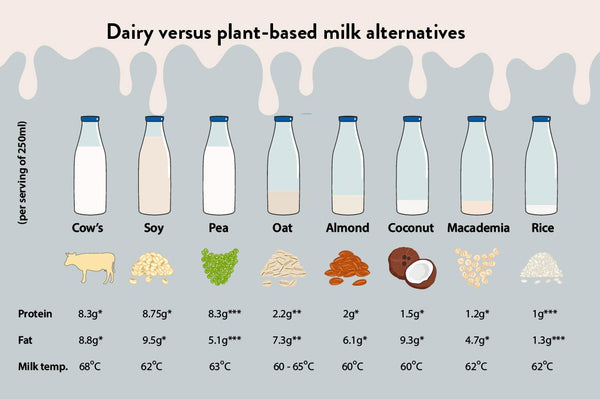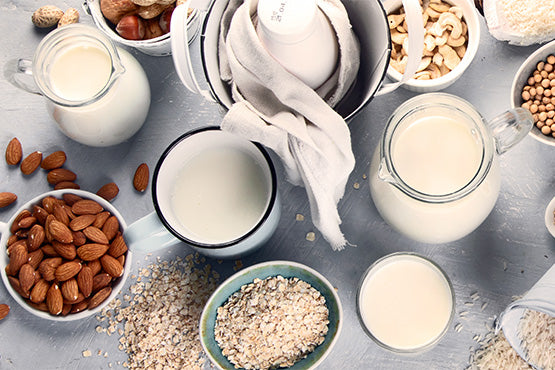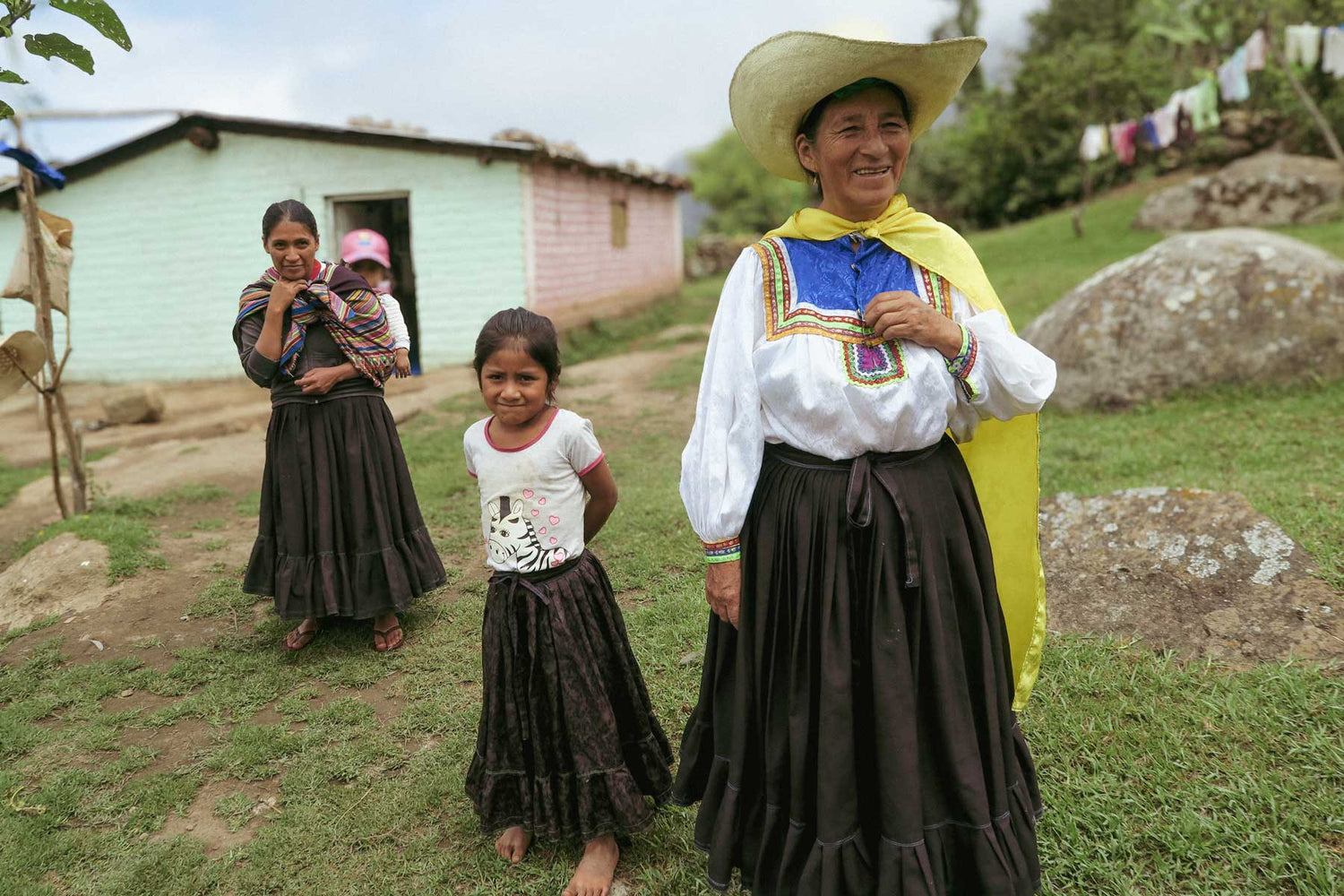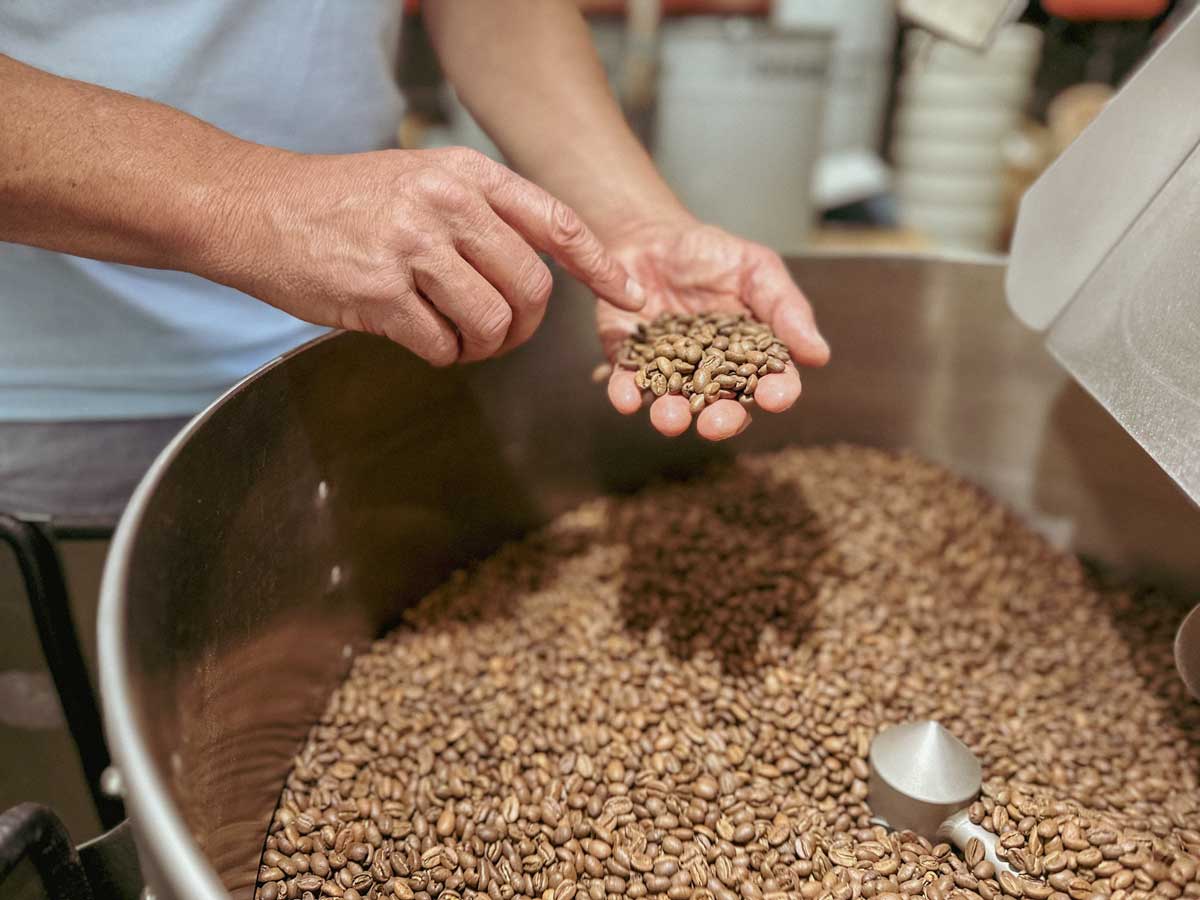Have you tried to prepare your latte at home using plant-based milk and been disappointed that your beverage didn’t quite turn out as expected? Using plant-based alternatives instead of cow's milk can be a bit tricky at first. We have set out below some tips when adding your favourite non-dairy milk alternative to your coffee-making routine.
Diverse cultures, allergies and dietary intolerances have led to the wide choice available of plant-based milk alternatives to complement your “cup of joe.” However, based on sector consumption figures in 2019, over 90% of Australians still prefer cow’s milk over other alternatives. There is no doubt that plant-based milk alternatives are on the rise. During the past four years, sales of non-dairy options grew 48 percent to 132 million litres, whilst diary-based milk grew only 4 percent over the same period to 1.3 billion litres.
With the fast-growing love for milk alternatives, we asked Maria Paoli, an accredited National Barista Judge and Coffee Trainer, to have a closer look at the different plant-based alternatives and to give some tips as to how best to prepare them with your coffee.
Maria says that to start with, not all milk alternatives are the same when it comes to their biological make-up. For instance, the molecular structure of each milk will determine the maximum temperature for texturing. Texturing refers to the creation of foam and the heating of the milk. Did you know the protein in milk is responsible for creating and stabilising the perfect microfoam on your latte, whilst fat in milk gives it that creamy texture?
When selecting a plant-based alternative, you might be spoilt for choice, with many options available on supermarket shelves. Many companies also offer barista-friendly plant-based milk options designed specifically for coffee beverages. These barista-friendly choices are modified to increase the stability of proteins to prevent a rapid change in pH when the plant-based milk comes in contact with the acidity of the coffee. They also often contain added fat for a creamier texture and better flavour.
Maria has put the 23 Degrees espresso blends, Morning Glory, Little Ripper and Mrs. Robinson, to the test and paired them with different milk alternatives.

*MilkLab; **The Alternative Dairy Co.; ***Australia’s Own; ****Living Planet
COW’S MILK
Before taking a look at non-dairy alternatives, let's talk about cow's milk. After all, it is still the most popular option. Cow’s Milk has always been traditionally used for milk-based coffee. The creamy texture of the milk which is high in carbohydrates and protein, makes it easy to stretch, and produce great results like that for a traditional cappuccino. Whether you choose A1 or A2 (A1 and A2 are specific proteins found in cow's milk, although in different proportions depending on the breed of cattle), cow’s milk can be textured in the same way and to higher temperatures than plant-based alternatives. Maria suggests heating cow's milk to around 68oC, but no more than 72oC, as it will burn and produce a pungent smell. The fat content in the milk does fuse well with the oils in coffee. When coffee is extracted, oils are forced through your brew and rise to the top as crema. Cow’s milk can be added to any style of roasting from light (more acidic) to darker roasts. The milk won’t curdle unless it is out of date. Cows milk is perfect with all 23 Degrees espresso blends.
SOY MILK
One of the most popular milk alternatives is soy milk. Soy milk is very high in protein, has a nutty taste, and is denser than other milk alternatives. Additionally, there are many barista-friendly soy milks available to make milk texturing easier. However, as a plant-based milk alternative, soy does not contain the enzymes and elasticity of dairy milk, which makes it more difficult to stretch in comparison to cow’s milk. Steam your soy milk to 62oC. When heated above 62oC, it spoils the quality of the milk. It may even curdle in some coffees, especially, if the coffee is high in acidity. We have found that soy milk performed the best overall and complimented all the coffees tested from 23 Degrees. If you enjoy milk-based coffee, we recommend a medium roasted profile works best. Light roasts tend to curdle the soy milk due to the increased acidity in the coffee beans.
Another great non-dairy alternative is oat milk. Oat milk is quite sweet, and there are also many barista-friendly alternatives that are available which allow the milk to be stretched. Oat milk should be heated to no more than 60oC if you want a dense outcome. However, if you prefer hot milk without that burnt smell, you can still texture to 65oC, but you may lose some of that creamy palate feel. Oat milk was most compatible with our Morning Glory espresso.
ALMOND MILK
Almond milk has a naturally bitter taste and also has minimal fat. There are some barista-friendly alternatives (with higher fat content) that have been thickened to help provide a creamy texture to your brew. Again, it is important to choose the right roasting profile. So a medium blend suits best. Try the almond with the sweet extraction of the Mrs. Robinson espresso blend. Do not heat above 60oC or it will compromise the quality of the textured milk.
COCONUT MILK
There are also many choices of coconut milk on supermarket shelves. My suggestion is creamy coconut milk with a thicker texture. Without the elasticity of dairy, it cannot be stretched in the same way nor should it be heated above 60oC. As coconut milk can be strong in flavour, it is important that the coffee roast profile you choose is not too acidic. A medium to dark roast is the best alternative. I suggest the Little Ripper, as it suits the profile well.
RICE MILK
Rice milk is rather difficult to texture. So keep on practising. It is not very creamy and is often fortified with a lot of sugar, so stretching is difficult. As rice milk is very sweet, it does suit the dark chocolate profile of coffee. It was best with Mrs. Robinson. Don’t heat the rice milk above 62oC.
MACADAMIA MILK
Macadamia milk, unlike almond, tends to be sweeter. The products offered are creamy and easy to texture. Best to heat no more than 62oC. The nutty and creamy flavour compliments any of the 23 Degrees coffees, especially that of Mrs. Robinson and Little Ripper.
PEA PROTEIN MILK
The newest kid on the block is Pea Protein Milk. It is made from green or yellow split peas and its protein has had most of its fibre and starch components removed. The milk was creamier and easier to texture and provided better results than some of the other dairy-free milks. I was able to texture to 62oC maintaining the smooth texture. It was a great compliment to all the coffees at 23 Degrees, particularly Morning Glory.
Keep practising and enjoy the milk you love - dairy or plant-based.
Maria Paoli







